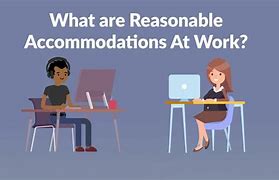Below is a review of the posts (on Facebook, LinkedIn, and X [formerly Twitter]) from the past week. You can check out the full posts by clicking on the links.

The post on Sunday 12/3/2023 was about accommodating disabilities under the ADA: just because you can doesn’t mean you must. Hopefully you know that the Americans with Disabilities Act (ADA) generally requires employers to provide reasonable accommodations to individuals with disabilities so that they can perform the essential functions of their job. What is often the issue is what exactly is a “reasonable accommodation” and when and what job functions are “essential.” A federal appeals court recently addressed these questions; the opinion provides helpful guidance.
In Geter v. Schneider National Carriers, Cierra Geter sued her employer, arguing that her requests for accommodation, which were to permit her to work remotely and to work part-time, were reasonable in light of pandemic-motivated business changes introduced by the employer after her termination. What did the employer say? See the post.
The court explained that the fact that an employer could temporarily allow employees to work remotely or on a part-time basis due to an unprecedented global pandemic did not mean the employer must continue those practices, or offer them as accommodations, after the circumstances giving rise to them abated. The court further discussed the effect of temporarily removing an essential job function in response to the COVID-19 pandemic on the essential nature of that function – see the post. So let’s go back and look at this more closely.
The employer, Schneider, is a transportation and logistics company that operates 24/7; it hired Ms. Geter to work as a full-time dispatch analyst on the overnight shift. What that entailed is listed in the post. After being diagnosed with PTSD, Ms. Geter took temporary leave. When the leave ended, Ms. Geter returned to work on a temporarily revised remote, part-time schedule. Why Schneider let her do that is in the post. That arrangement had been in place for months when Ms. Geter requested that she be permitted to continue to work indefinitely on a remote, part-time basis. Schneider denied the request, indicating that full-time, in-office work was an essential function of her position. When she disagreed, it then terminated her employment. Ms. Geter filed suit.
Ms. Geter alleged in the suit that neither her presence in the office nor working full-time was essential for her position. But she did make some admissions – see the post. Ms. Geter’s employment ended in 2019, but during the pendency of her suit, the COVID-19 pandemic raged. During the pandemic Schneider made numerous adjustments to continue its operations, including allowing some remote work and other process changes. In March 2021, Schneider returned to a full-time, in-person work schedule and otherwise suspended the pandemic-related changes. How did Ms. Geter argue that this supported her suit? See the post.
The trial judge found, and the appeals court agreed, that policies and practices adopted after Ms. Geter’s termination – which were implemented in response to a global pandemic – were not illustrative of the workplace Ms. Geter worked in when she was terminated in 2019, about a year before the COVID-19 pandemic began. While making certain concessions and admissions (see the post), Ms. Geter still argued that in-person work was not essential (pointing to one policy as noted in the post). The court did not buy it, noting the “bare feasibility” of changes after her termination and in response to a global pandemic did not mean that Schneider considered what it deemed essential functions to be otherwise. And what was the effect by Schneider being able to change how a job was performed on the essential nature of a job function? See the post. In the end, summary judgment for Schneider was affirmed.
TAKEAWAY: Pandemic-era workplace policies may not be the new normal – this is incredibly fact-dependent. An employment lawyer should be consulted.

The post on Monday 12/4/2023 told us that trucking firms settle federal allegations of hiring discrimination. Covenant Transport Inc. and its affiliated entity Transport Management Services LLC will pay $700,000 to the federal government as part of an anti-discrimination settlement that resolves a determination that the company violated the anti-discrimination provision of the Immigration and Nationality Act (INA) by routinely discriminating against non-U.S. citizen workers when checking their permission to work in the United States. What action taken by the company from January 2020 through at least August 2022 was found to be routinely discriminatory? See the post. Note that federal law allows all workers to choose which valid, legally acceptable documentation to present relative to their identity and permission to work, regardless of citizenship status, immigration status or national origin. The INA has an anti-discrimination provision; what it provides is in the post. How that can play out is discussed in the post. The settlement involves more than “just” payment of the $700,000; there is also continuing non-monetary relief as listed in the post.
TAKEAWAY: Employers must know what documents they can and cannot request as part of the hiring process. It can be expensive if they make a mistake.

The post on Tuesday 12/5/2023 explained why your company needs a workplace harassment policy and attorney (hint: preventing legal consequences). Workplace harassment is serious; it can have detrimental effects on both employees and employers. What is it at its most basic? See the post. It can come from anyone in the workplace – superiors, colleagues, or even clients – and is not limited to just one form. It can include sexual harassment, racial discrimination, bullying, and retaliation. A non-exclusive list of how those things can be exhibited is in the post. It is important to understand the different forms of harassment and how they can manifest in the workplace to enable quick corrective action.
Let’s start with what constitutes harassment in the workplace. It can be defined as any form of unwelcome conduct or behavior that creates an intimidating, hostile, or offensive work environment for an individual. What that can include is noted in the post. It is not limited to actions between those of opposite genders but is more expansive as noted in the post. Workplace harassment can result in legal liability for the employer under various federal and state laws including Title VII of the Civil Rights Act and the Americans with Disabilities Act (ADA) if no preventative action is taken.
So what can an attorney do for a company relative to workplace harassment? First, the attorney can make sure that you understand and comply with all relevant laws. How do they do that? See the post. A workplace harassment lawyer can also help protect your company against claims by ensuring that thorough investigations into any reported incidents of harassment are conducted and necessary steps to address the actions are taken promptly. And what if an employee files a lawsuit against your company for alleged acts of workplace harassment? Yep, the attorney will be there to do the things noted in the post. Nd why do we keep saying “workplace harassment attorney”? Because they spend more time, and have more experience,
handling cases related to discrimination, sexual harassment, and other forms of workplace misconduct and more as detailed in the post. One thing such an attorney can do to help your company is by conducting an audit of your current policies and procedures related to preventing and addressing workplace harassment. What they will do, and how it can help you, is noted in the post.
And what should you do if a workplace harassment suit is filed against your company? First, before you do or say anything, get that experienced workplace harassment attorney on board. The attorney will provide expert advice on how to proceed. Part of that advice will probably be to conduct a thorough internal investigation. What that entails is listed in the post. Other steps to be taken are also listed and discussed in the post.
But what if your company wants to work on preventing workplace harassment suits and liability? There are some tips you can follow. First, establish clear policies against workplace harassment. How and where that should be done is in the post. Next, provide regular training to employees on recognizing and preventing workplace harassment. What that training should include is noted in the post. Additional steps are also listed and discussed in the post.
TAKEAWAY: Employers must ensure that workplace harassment does not happen in the workplace; if there are complaints, they must be quickly and thoroughly investigated and appropriate action taken, all under the guidance of the appropriate lawyer.

The post on Wednesday 12/6/2023 was about navigating condominium (and homeowner) associations: tips for a smooth and successful experience. As more and more people live in a community association (whether condominium, cooperative, or homeowners), it is imperative to understand what rights and obligations come along with that form of residential living. While the post focuses on condominiums, most of what it says applies to life in a cooperative or homeowners’ association too.
One must first understand that these Associations are legal entities; they manage the common areas of the community. In Pennsylvania they are governed by a board of directors elected by the owners. What the board must do is noted in the post. The Board, and entire community, are governed by the Declaration of Covenants, Conditions, and Restrictions (CC&Rs) which is essentially the rule book for the community. Examples of what the CC&Rs may contain are in the post. Owners must read and understand the CC&Rs to avoid potential conflicts or misunderstandings. But that’s not all. Associations also usually have bylaws; their function is described in the post. There might also be Rules & Regulations that provide further clarification, interpretation and guidelines.
One of the most important aspects of living in a community association is the payment of periodic fees or assessments. These fees are typically used to maintain the common areas including those things listed in the post (many of which are the reason people actually want to live in that community). Assessments may also be used to fund a reserve for major repairs or improvements. All owners in a community association are legally obligated to pay the fees and failure to do so can result in serious consequences, including legal action.
Another important part of navigating community association life is understanding the association’s dispute resolution process. Conflicts will and do arise so it’s good to know how to resolve them. Examples are in the post. Finally, remember that community associations are made up of owners. Those owners have a say in how the association is run. So what can owners do? See the short list in the post for a few examples.
TAKEAWAY: Understanding the rights and obligations of owners and the Board will make life in a condominium or homeowners’ association or cooperative much more enjoyable; community association lawyers can help.

In the post on Thursday 12/7/2023, we talked about what are (condo and) HOA fees – a good basic explanation (and a follow-up to our post on Wednesday 12/6/2023). When a community is governed by a homeowners’ association (HOA), owners must pay fees to the association on a regular basis (whether annually, monthly, or on some other periodic basis). The fees cover the costs of maintaining the community’s shared amenities and services. The amount of the HOA fee varies with every neighborhood because of the different amenities and obligations that the association must fulfill. Let’s take a closer look at what HOA fees pay for, how they can benefit the owner, and how much the fees cost on average.
Keep in mind that an HOA is a private organization that governs a defined community, neighborhood or condominium building. The HOA creates and enforces rules — the main one of which is embodied in the Declaration of covenants, conditions and restrictions (CC&Rs) but includes bylaws and rules & regulations. Who operates the HOA? See the post. Owners pay the mandatory dues to cover the community’s expenses and to maintain common areas and amenities. In addition to the dues, an HOA might need to levy special assessments to pay for expensive repairs and upgrades. More detail on this is in the post. And what do the usual, recurring dues cover? Shared services and amenities that might include some or all of the items listed in the post. Keep in mind that communities with higher HOA fees usually have more amenities and perks versus communities with smaller dues.
Owners (or potential purchasers) want to know what they will need to pay each month in HOA fees. As explained, those fees go up in areas with high living costs as well as when the HOA provides more services and amenities. HOA fees can also increase when inflation rises because the costs of materials and repairs increase. The average monthly homeowners and condo association dues several metropolitan areas are listed in the post. Potential purchasers should make sure to include association dues in their budget.
All owners of a unit within an HOA must pay dues and special assessments. The fee is part of the legal bargain – see the post. And while an HOA is a private organization, it can still take legal action to collect delinquent payments. Some of the ramifications of not paying the dues? See the post.
People sometimes question whether living in a community with an HOA and paying the fee is worth it. That is a very subjective question, but that lifestyle brings things like common areas (including access to more recreational and social features like a community swimming pool), maintenance (especially in condo associations), and the other things listed and described in the post.
The flip side is that if an HOA has high dues because of various amenities and the owner will not use the amenities, that might not be the right community for that person. Frequently asked questions (FAQs), including whether you can be evicted for not paying HOA fees, are also in the post.
TAKEAWAY: More and more neighborhoods have some type of community association; understanding rights and obligations is important – as is having a community association lawyer on standby.

The post on Friday 12/8/2023 noted that AI is changing the recruiting game; it may also be violating the rules. What?!?! Recent guidance from the EEOC, and a landmark lawsuit (see our post on Monday 11/13/2023) show employers where they may run afoul of longstanding anti-discrimination regulations due to AI recruiting technology. Yes, AI-powered technologies can save time, effort and money. But they can also violate rules or statutes, putting the employer in hot water. Some caveats …
Caveat No. 1: Never assume AI tech is bias-free. AI tech is only as good as the data it’s trained on. And the AI solution your company is using right now to facilitate recruitment may violate Title VII! In the settlement we posted about on 11/13/2023, the EEOC filed a lawsuit on behalf of the nearly 200 affected people and the company agreed to pay $365,000. Why was this important? See the post.
Caveat No. 2: Caveat emptor (buyer beware). Employers who purchase AI tech solutions from external vendors are on the hook. See the post for more details, including a link to guidance issued by the EEOC earlier this year. The guidance places the burden of responsibility and compliance directly on employers. The third caveat is noted and discussed in the post.
So how can employers prevent AI-embedded bias? First, ask technology vendors some very specific questions, preferably before purchase, including what steps have been taken to ensure their AI products don’t cause an adverse or disparate impact on any group of job candidates or employees, have they applied the four-fifths rule in developing their products, and more as described in the post. But employers cannot just accept the vendor’s answers; no, they should do their own testing of the product.
None of this is a one-and-done proposition. Employers must remain ever-vigilant, periodically testing AI tools and reviewing policies and procedures. It’s also a good idea to work with the company’s employment lawyer to conduct annual AI bias audits (even before it becomes mandatory as some cities and stated are considering). What the audit entails is in the post.
TAKEAWAY: Employers are ultimately responsible for what their company does; violations involving AI should be preventable by knowing the law and limitations.

Finally, in the post yesterday 12/9/2023, we were reminded that the Equal Pay Act does not apply to applicants. Different laws apply to different businesses or to different worker classes. It is imperative to know to whom a law applies. For example, here an applicant filed suit when she found out that another employee was being paid more than what she would have been paid had she become employed. More background details, some of which are key, are in the past. The court reminded us (and her) that the Equal Pay Act does not apply to applicants, but only to employees. And that makes sense because an applicant has no damages, i.e., s/he has not been paid less than anyone since they have not yet been paid!
TAKEAWAY: While most laws apply to both applicants and employees, not all do. It is a must to know which law applies and to whom; an employment lawyer can help.

 York, Pennsylvania 17403
York, Pennsylvania 17403